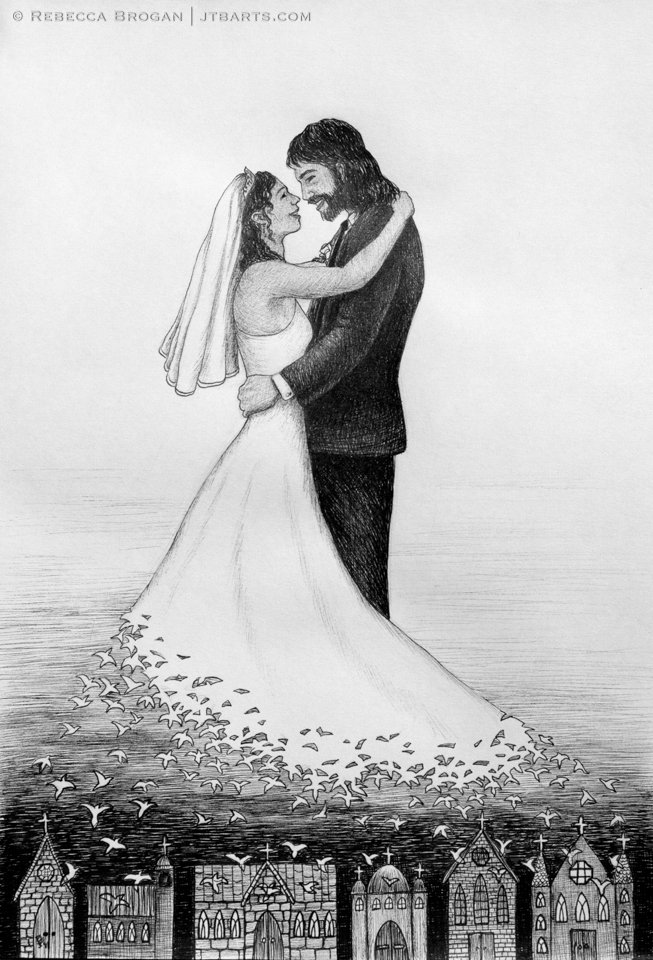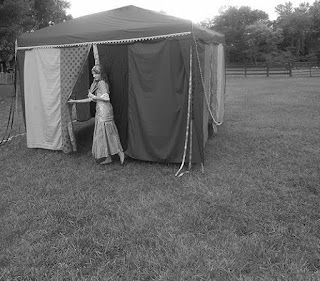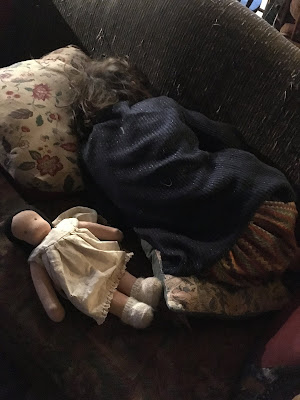Christianity, Please -- Hold the Church! (republished from Dec. 1, 2003)
Well, I, as a Roman Catholic, already believe that Christ was married. Is married, actually. Not to Mary Magdalene, as the book breathlessly postulates, but to His Church, in a passionate, indissoluble union. And this, as St. Paul says, is a mystery. And a largely misunderstood and unappreciated mystery, particularly today.
The union between Christ and the Church is so profoundly deep that St. Paul goes so far as to refer to the Church as Christ's Body, citing Genesis: "a man shall ... cleave to his wife and the two shall become one body." In fact, human marriage is a pale reflection of this ultimate marriage, created when Christ laid down His life for His bride.
But just as many people have come to accept divorce, many truly prefer to take Christ without dealing with His Wife. In a sense, they prefer to see Christ as a single Guy -- just the Heroic Savior, not a Holy Husband.
Why is this? Well, I can understand it. Despite the fact that He said and did all sorts of things we might find unsettling, Jesus Christ is a really great guy. Most people find Him attractive on some level. If you can overlook the embarrassing episode of the Crucifixion, Christ was the winner, the victorious savior, never making any mistakes or committing any sins, triumphantly rising from the dead and opening the gates of heaven. The Church, on the other hand, is a whole other ball of wax. Now, I'm not talking about the fuzzy invisible Church, which is sort of like a secret club where only God knows the membership list. I'm talking about the institutional Church -- yes, the one with a building, down on the local street corner -- and the pastors and bureaucrats who pay the heating bills and keep the books: the Church, that historical thing that's been around for a couple hundred -- well, make that a couple thousand -- years. It's that body of believers who include the non-heroic, the non-victorious -- okay, the losers. Not to mention the sinful, the incompetent, the lax, and even the criminal. Kind of like those unsavory and unimaginative characters Jesus made a habit of hanging around with when He walked the roads of Israel.
Personally, I have come to see the necessity of a concrete relationship with His Bride. And I have come to recognize her manifestations even in the creaky bureaucracy and sometimes poorly executed liturgies of the Church. It made it easier to love Her once I started to recognize the features of an eternal beauty beneath the externals. I can even sense a personality of practicality and dogged persistence.
Christ's Wife has a hidden beauty, but also a concrete presence. In traditional parlance, she is "Mother Kirk" -- the mother of the faithful, raising up sons and daughters for her Spouse. Just as Israel was not a vague idea of nationhood but a real nation on a particular continent with particular inhabitants, so the Church is a real, organized community built by Christ on a particular person, with particular members on earth that include the good, the bad, and the ugly.
But many people don't want any part of a church, particularly not one that could tie them down. There are several reasons. One of the biggest is acceptance of authority. Americans particularly dislike authority, but I suspect all humans are prone to the stiff-necked habits about which the Lord complained in the Israelites.
Talk about submitting yourself to the Church, and you're talking about doing something very scary. Even if you've come around to the idea of submitting yourself to Christ, there's an entirely different quality to submitting to the Church -- just as obeying your father is different than obeying your mother. As I am experiencing first-hand with five kids, it's easier for children to ignore a mother; so maybe that's why it's harder to do what she says.
As near as I can tell, being a Christian without the Church is like dating Christ. He's this guy you see on the weekends. Well, if you're really serious, you make sure you give Him a call every day, just to check in, talk to Him. And to keep that romance alive, every once in a while, you do something special -- you know, go on a retreat.
It's not that there's no commitment -- there is. It's not that there's no true love -- there is. But all the same, there's independence. In a very concrete way, it's accepting religion -- and God -- on your own terms, choosing which of His friends you will accept, which teachings of His speak the most to your life at this particular time. And when your relationship with other Christians cools -- well, you can stay with Christ and still go elsewhere, can't you?But joining the Church can be like getting married. We're talking about a commitment that's not on your own terms, but on someone else's terms -- a someone who's going to notice if you don't show up for dinner. A someone who's going to have the right to invade your privacy. And once you commit, you're expected to stay -- forever.
This someone -- the institutional Church, the Bride in her working clothes: Mother Church -- is in three dimensions, Her orders and influence stretching out in four directions. She's got House Rules and lists of Things to Do, lists of offenses and punishments; and she offers advice, often when you don't want it. She attaches consequences to your actions. She makes requests from your wallet. She demands love -- love for a lot of people you'd rather not love. And in her human side, she messes up. And that's a problem -- but it doesn't absolve you of your own responsibilities in the relationship.
What responsibilities? Well, marriage is not just keeping your vows, but keeping them well. Raising children, being faithful, sometimes putting up with decisions you don't really like. It means tolerating idiosyncrasies, burnt cooking, leaky pipes, bad credit, illnesses, death, family reunions. It means biting your tongue, speaking the truth, staying up in the night with the sick, bearing with relatives. It means dysfunction and scandals and difficult situations as you journey together to your heavenly destination.
Not surprisingly, the Church is likely to be the most difficult part of practicing one's faith. I've noticed that some Christians who are most enthusiastic about incarnating their faith in their daily lives grow chilly when it comes to contemplating the first, most obvious way of incarnating Christ's mission -- the Church. For them, the Church should remain some dream girl in white linen who's going to appear in the sky at the Second Coming -- not some Woman around here right now from whom we need to take orders.
For far too many followers of Christ, the Church is not a necessity, it's an option: one we've never really gotten around to looking into, like bachelors with girlfriends they're constantly putting off buying a ring for, and proposing to.
So I'll go out on a limb. I believe that those who want to identify with Christ while dissociating themselves from the Church are really dissociating themselves from Christ. Because, you see, Christ was serious when He married the Church. He made her His Body, His physical manifestation of Himself on earth. He's not going to leave her. And those who reject her inevitably end up leaving Him behind.
Christ without the Church is a disembodied Christ. Christ without the Church is a divorced Christ. Neither of these is the real Word made Flesh.
If you want all of Him, you must deal with Her. She's His Body. It's that simple.



Comments